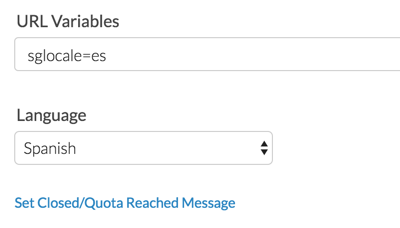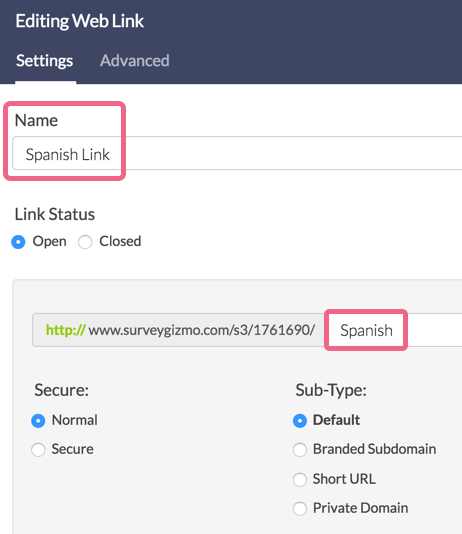Using our Text & Translations tool you can provide a complete translation of your survey including question titles, answer options, as well as, error messages and button text.
This is generally the best practice for providing translated versions of your survey. To learn more visit our Translate Your Survey Tutorial.
A unique situation can arise when questions or actions are relevant only to certain languages. Say, for example, you are collecting contact information and the necessary fields for respondents living in Spain are different than for those in the US or France. Let's imagine we've built a survey with a default language of English and we are providing French and Spanish translations. Let's imagine that the County field of a Contact Form question is necessary only for Spanish-speaking respondents. Using language-based logic you can display a specific field only when necessary.
The below example describes applying language-based logic to a question. This type of logic can also be used to fire specific actions. i.e. sending different email actions depending on language, or redirecting to different links/urls based on language.
Requirements for Setting Up Language-Based Logic
In order to set up language-based logic you must:
- [Recommended] Use the Language Bar to allow survey respondents to select their language.
OR - Use a dedicated share link for each language and set up the sglocale URL Variable. Learn how.
Setting Up Language Based Logic
- Edit the question you wish to conditionally display based on language and go to the Logic tab. Select the option to Only show this question based on answers to previous questions or other logic conditions.
- On the left of the logic builder, select URL Variable.
- In the text field enter the URL Variable for language which is as follows: sglocale.
- The operator in the middle should be is exactly equal to.
- On the right-hand side, enter the language code (see reference) for which you wish the question to display. In our example, we entered es. It is important to use the language code exactly.

If you are using this method to fire different versions of Send Email Actions or URL Redirect Actions, you will need a separate action for each language version. Each separate action will then need its own unique logic condition to dictate when it needs to fire.
Check it out in this survey:
http://www.surveygizmo.com/s3/1761690/Language-Logic
By default, the survey will display in English. Notice the "County" question does not display. Click the Language Bar up top and select Spanish. You'll now see the Condado question display!

Add a survey with this setup to your account!
Setting Up Language-Specific Links
While the Language Bar is the preferred method for sharing translated surveys you can also share dedicated links for each language.
- Go to your Share tab and click the option to Create New Tracking Link on the lower portion of the page.
- On the Advanced tab change the Language from Auto to one of your translated languages.
- In the URL Variables field set up the sglocale URL variable. You will need to enter the language code see reference for which you wish the question to display. For example sglocale=es.

- As a best practice be sure to use the language as the Name of the link. You can also put this information in the URL via the edit this link option.

Language Codes
| Language | Code |
|---|---|
| Abkhazian | ab |
| Avestan | ae |
| Afrikaans | af |
| Akan | ak |
| Amharic | am |
| Aragonese | an |
| Arabic | ar |
| Assamese | as |
| Avaric | av |
| Aymara | ay |
| Azerbaijani | az |
| Bashkir | ba |
| Belarusian | be |
| Bulgarian | bg |
| Bihari | bh |
| Bislama | bi |
| Bambara | bm |
| Bengali | bn |
| Tibetan | bo |
| Breton | br |
| Bosnian | bs |
| Catalan | ca |
| Chechen | ce |
| Chamorro | ch |
| Corsican | co |
| Cree | cr |
| Czech | cs |
| Church Slavic | cu |
| Chuvash | cv |
| Welsh | cy |
| Danish | da |
| German | de |
| German (Austria) | de-at |
| German (Switzerland) | de-ch |
| Divehi | dv |
| Dzongkha | dz |
| Ewe | ee |
| Greek | el |
| English | en |
| English (Australia) | en-au |
| English (Canada) | en-ca |
| English (South Africa) | en-za |
| English (UK) | en-gb |
| Esperanto | eo |
| Spanish | es |
| Spanish (Mexico) | es-mx |
| Spanish (United States) | es-us |
| Estonian | et |
| Basque | eu |
| Persian | fa |
| Fulah | ff |
| Finnish | fi |
| Fijian | fj |
| Faroese | fo |
| French | fr |
| French (Canada) | fr-ca |
| French (Belgium) | fr-be |
| French (France) | fr-fr |
| French (Luxembourg) | fr-lu |
| French (Monaco) | fr-mc |
| French (Switzerland) | fr-ch |
| Western Frisian | fy |
| Irish | ga |
| Scottish Gaelic | gd |
| Galician | gl |
| Guarani | gn |
| Gujarati | gu |
| Manx | gv |
| Hausa | ha |
| Hebrew | he |
| Hindi | hi |
| Hiri Motu | ho |
| Croatian | hr |
| Haitian | ht |
| Hungarian | hu |
| Armenian | hy |
| Herero | hz |
| Interlingua | ia |
| Indonesian | id |
| Interlingue | ie |
| Igbo | ig |
| Sichuan Yi | ii |
| Inupiaq | ik |
| Ido | io |
| Icelandic | is |
| Italian | it |
| Italian (Switzerland) | it-ch |
| Inuktitut | iu |
| Japanese | ja |
| Javanese | jv |
| Georgian | ka |
| Kongo | kg |
| Kikuyu | ki |
| Kwanyama | kj |
| Kazakh | kk |
| Kalaallisut | kl |
| Khmer | km |
| Kannada | kn |
| Korean | ko |
| Kanuri | kr |
| Kashmiri | ks |
| Kurdish | ku |
| Komi | kv |
| Cornish | kw |
| Kirghiz | ky |
| Latin | la |
| Luxembourgish | lb |
| Ganda | lg |
| Limburgish | li |
| Lingala | ln |
| Lao | lo |
| Lithuanian | lt |
| Luba-Katanga | lu |
| Latvian | lv |
| Malagasy | mg |
| Marshallese | mh |
| Maori | mi |
| Macedonian | mk |
| Malayalam | ml |
| Mongolian | mn |
| Marathi | mr |
| Malay | ms |
| Maltese | mt |
| Burmese | my |
| Nauru | na |
| Norwegian Bokmal | nb |
| North Ndebele | nd |
| Nepali | ne |
| Ndonga | ng |
| Dutch | nl |
| Norwegian Nynorsk | nn |
| Norwegian | no |
| South Ndebele | nr |
| Navajo | nv |
| Chichewa | ny |
| Occitan | oc |
| Ojibwa | oj |
| Oromo | om |
| Oriya | or |
| Ossetian | os |
| Panjabi | pa |
| Pali | pi |
| Polish | pl |
| Pashto | ps |
| Portuguese | pt |
| Portuguese (Brazil) | pt-br |
| Quechua | qu |
| Raeto-Romance | rm |
| Kirundi | rn |
| Romanian | ro |
| Russian | ru |
| Kinyarwanda | rw |
| Sanskrit | sa |
| Sardinian | sc |
| Sindhi | sd |
| Northern Sami | se |
| Sango | sg |
| Sinhala | si |
| Slovak | sk |
| Slovenian | sl |
| Samoan | sm |
| Shona | sn |
| Somali | so |
| Albanian | sq |
| Serbian | sr |
| Swati | ss |
| Southern Sotho | st |
| Sundanese | su |
| Swedish | sv |
| Swahili | sw |
| Tamil | ta |
| Telugu | te |
| Tajik | tg |
| Thai | th |
| Tigrinya | ti |
| Turkmen | tk |
| Tagalog | tl |
| Tswana | tn |
| Tonga | to |
| Turkish | tr |
| Tsonga | ts |
| Tatar | tt |
| Twi | tw |
| Tahitian | ty |
| Uighur | ug |
| Ukrainian | uk |
| Urdu | ur |
| Uzbek | uz |
| Venda | ve |
| Vietnamese | vi |
| Volapuk | vo |
| Walloon | wa |
| Wolof | wo |
| Xhosa | xh |
| Yiddish | yi |
| Yoruba | yo |
| Zhuang | za |
| Chinese (simplified) | zh |
| Chinese (Hong Kong) | zh-hk |
| Chinese (Taiwan | zh-tw |
| Chinese (PRC) | zh-cn |
| Chinese (Singapore) | zh-sg |
| Zulu | zu |



Admin
— Dave Domagalski on 03/20/2018
@Web: Thank you for your kind words and for sharing your findings!
David
Documentation Specialist
SurveyGizmo Customer Experience